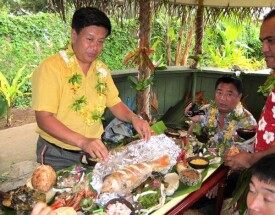共找到2條詞條名為湯加語的結果 展開
- 南島語系馬來—波利尼西亞語族
- 中國普通高等學校本科專業
湯加語
南島語系馬來—波利尼西亞語族
湯加語(英語:Tongan /湯加語:Faka-Tonga),屬於南島語系馬來—波利尼西亞語族,主要用於湯加王國,亦使用於美屬薩摩亞、澳大利亞、加拿大、斐濟、紐西蘭、紐埃、美國和萬那杜,使用拉丁字母拼寫,基本語序為VSO(即語序為:謂主賓)。使用人口約10萬。
| 母音 | a [a] e [e]/[ə] i [i] o [o] u [u] è [ɛ] ò [ɔ] |
| 輔音 | b [b] d [d] dy [dʲ]~[dʑ]/[ɟʝ] f [f] g [ɡ] h [h] k [k] l [l] m [m] n [n]/[m]/[ŋ] ng [ŋ] ny [ɲ] p [p] r [r] s [s] sy [sʲ]~[ɕ] t [t] ty [tʲ]~[tɕ]/[cç] w [w] z [z] |
| 顎音化 | ty [tʲ]→[tɕ]/[cç] dy [dʲ]→[dʑ]/[ɟʝ] sy [sʲ]→[ɕ] ny [ɲ] |
| 注意 | ty、dy、sy、ny讀[tɕ]、[dʑ]、[ɕ]、[ɲ]使用菲律賓的塔加洛語。 日本式羅馬字當中的ty、dy、sy、ny從[tʲ]、[dʲ]、[sʲ]、[ɲ]轉換[tɕ]、[dʑ]、[ɕ]、[ɲ]使用菲律賓的塔加洛語 |
| 英語 | 湯加語 |
| Welcome | Talitali fiefia |
| Hello (General greeting) | Mālō e lelei (inf) Mālō ‘etau lava (frm) |
| How are you? | Fēfē hake? (sg) Mo fēfē hake? (dl) Mou fēfē hake? (tr) |
| Reply to 'How are you?' | Sai pē, mālō, fēfē koe? |
| Long time no see | Fuoloa 'e fepulingaki |
| What's your name? | Ko hai ho hingoa? |
| My name is ... | Ko hoku hingoa ko... |
| Where are you from? | Ko ho'o ha'u mei fe? |
| I'm from ... | Ko 'eku ha'u mei ... |
| Pleased to meet you | Fiefia ke toe feiloaki mo koe |
Good morning (Morning greeting) | Mālō tau ma‘u e pongipongi ni |
| Good day | Mālō e lelei Mālō e laumalie (to a chief) Mālō e lakoifua (to a monarch) |
Good afternoon (Afternoon greeting) | Mālō tau ma‘u e ho‘ata ni |
Good evening (Evening greeting) | Mālō tau ma‘u e efiafi ni |
| Good night | Po‘uli a Mohe a |
Goodbye (Parting phrases) | ‘Alu a (to sb going) Faka’au ā (to sb going- vfrm) Nofo ā (to sb staying) Toki sio (see you later - inf) |
| Good luck! | Monū'ia |
Cheers! Good Health! (Toasts used when drinking) | Ofa atu! |
| Have a nice day | Ma'u ha aho lelei |
Bon appetit / Have a nice meal | |
Bon voyage / Have a good journey | |
| I understand | ‘Oku mahino kiate ‘au |
| I don't understand | ‘ikai mahino |
| Please speak more slowly | Fakamolemole duku ho lea vave |
| Please say that again | Fakamolemole toe tala mai |
| Please write it down | Kataki ‘o tohi‘i mai |
| Do you speak English? | ‘Oku ke lava ‘o lea faka-pālangi? |
| Do you speakTongan? | ‘Oku ke lava ‘o lea faka-Tonga? |
Yes, a little (reply to 'Do you speak ...?') | ‘Oku ou lea faka-Tonga si’isi’i pē |
| How do you say ... inTongan? | Ko e hā ‘a e le‘a faka-Tonga ki he ...? |
| Excuse me | Kātaki Tulou |
| How much is this? | ‘Oku fiha e? Fija hono totongi? |
| Sorry | Fakamolemole |
| Please | Kātaki |
| Thank you | Mālō Mālō ‘aupito |
| Reply to thank you | ‘Io mālō |
| Where's the toilet? | Ko fē ‘a e falemālōlō? |
| This gentleman will pay for everything | 'E totongi kātoa 'ehe tamasi'i. (>children & young people) 'E totongi kātoa 'ehe tangata. (>married & middle aged people) 'E totongi kātoa 'ehe tangata'eiki. (>the elderly) |
| This lady will pay for everything | 'E totongi kātoa 'ehe tahine. (>children & young people) 'E totongi kātoa 'ehe fefine. (>married & middle aged people) 'E totongi kātoa 'ehe fine'eiki. (>the elderly) |
| Would you like to dance with me? | Teke lava tauolunga mo au? |
| I love you | ‘Oku ou ‘ofa ‘ia koe |
| Get well soon | |
| Leave me alone! | |
| Help! | Tokoni mai! |
| Fire! | Koe afi! |
| Stop! | Tuku ia! |
| Call the police! | Teu ta ki he polise! |
| Christmas and New Year greetings | Kilisimasi fiefia mo ha ta'u fo'ou monū'ia |
| Easter greetings | Ma'u ha 'aho Pekia fiefia. |
| Birthday greetings | Ma'u ha 'aho fiefie Ma'u ha 'aho fa'ele'i fiefia |
| One language is never enough | He'ikai fe'unga ke 'ilo ha lea 'e taha. |
My hovercraft is full of eels Why this phrase? | Hoku vakapuna tētē 'i 'olunga fono 'i he toke |
